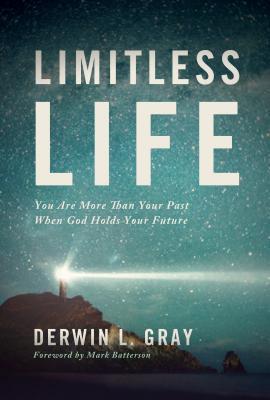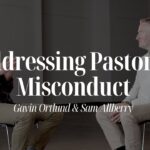Derwin Gray. Limitless Life: You Are More Than Your Past When God Holds Your Future. Nashville, TN: Thomas Nelson, 2013. 240 pp. $15.99.
 Derwin Gray is a former NFL player also known as the “evangelism linebacker.” He now serves in the Charlotte area as the pastor of Transformation Church, which has been recognized as one of the fastest-growing churches in America. In Limitless Life: You Are More Than Your Past When God Holds Your Future, Gray seeks to show how Jesus replaces the negative labels that define and limit our lives with a new identity, established by the forgiveness and freedom he offers. Each of the book’s ten chapters addresses a specific label and points toward its gospel counterpart (for example, “from addict to free,” “from orphan to adopted,” “from failure to faithful,” and so on). Much of Limitless Life is orthodox and edifying, but at many moments its portrayal of the Christian life is difficult to distinguish from a self-help appeal.
Derwin Gray is a former NFL player also known as the “evangelism linebacker.” He now serves in the Charlotte area as the pastor of Transformation Church, which has been recognized as one of the fastest-growing churches in America. In Limitless Life: You Are More Than Your Past When God Holds Your Future, Gray seeks to show how Jesus replaces the negative labels that define and limit our lives with a new identity, established by the forgiveness and freedom he offers. Each of the book’s ten chapters addresses a specific label and points toward its gospel counterpart (for example, “from addict to free,” “from orphan to adopted,” “from failure to faithful,” and so on). Much of Limitless Life is orthodox and edifying, but at many moments its portrayal of the Christian life is difficult to distinguish from a self-help appeal.
Celebrating Jesus’ Power to Save
I don’t want any concerns I express to drown out my gratitude for the book’s fine qualities and helpful material. My heart frequently resonated with Gray’s passionate celebration of Jesus’ power to save. This is the book’s primary theme: Jesus is a mighty Savior who can and will thoroughly transform our lives. He can turn bad to good, darkness to light, suffering to glory, fear to courage, failure to redemption. To this I can only say, “Amen!”
I also appreciated the pastoral thrust of Limitless Life. Gray’s writing isn’t always smooth and polished, but it’s clear and honest. He’s obviously writing to help people and seems to sincerely desire the spread of God’s kingdom and lives changed for Christ. I appreciated his concern for drawing out how the gospel makes practical differences for issues like fear, resentment, father wounds, shame, self-righteousness, and purposelessness. The “Transformation Moment” at the end of each chapter reflects the book’s practical focus and prayerful tone. Further, Gray’s pastoral intuition and sensitivity come forth in many of his illustrations. Good examples include his wise counsel to an anonymous blog commenter who disliked thinking of God as father because of his or her father wound (pp. 70-72) or Gray’s superb exhortation to generosity in tithing (147-151).
One aspect of Gray’s book I particularly appreciated was his passion for racial reconciliation and diversity in the church (12-13, 101-104, 124-126). Gray had many helpful things to say on this topic, and I wonder if he might have more to say on it in the future. I’d certainly be a sympathetic listener.
Struggling on How to Place the Book
I didn’t know anything about Gray before reading this book, so I attempted to give it a cautious and open-minded read. I had my guard up somewhat because of some initial impressions, but I tried to avoid anything like a dismissive judgment and to really give the book a chance. As I did, many of my concerns were checked, and my overall impression was modified. I struggled for several days, going back and forth on how exactly to place the book.
After much reflection, I’ve boiled down my conclusions into two lingering concerns. I hope and pray my comments here find that elusive blend of discernment plus generosity.
For What Problem Is Jesus the Solution?
First, I worry that in focusing so heavily on freedom from defining labels and limits, Limitless Life doesn’t give sufficient emphasis to repentance. Labels are projected onto us from others; sin comes from within. Dealing with labels is often a freeing and affirming project; repenting of sin is typically arduous and humbling. One whose ultimate problem is labels can be a mere victim; one whose ultimate problem is sin must take personal responsibility for his condition. Don’t get me wrong: I understand negative labels can be a powerful component of our fallen condition and need to be redeemed by the gospel. I think, for example, of God renaming people in Scripture (Abram/Abraham, Simon/Peter), or calling individuals renowned for their sinful behavior (like tax collectors or prostitutes) and completely changing their identity. But Christian growth entails not merely embracing a new identity (faith); it also involves denying oneself and fighting indwelling sin (repentance). Gray’s book can give the impression that our greatest spiritual problem is ultimately outside us, rather than within.
To be fair, I wasn’t always sure where this concern was bound up with Gray’s language and presentation and where it pertained to his actual theology (hence my struggle in placing the book). Gray acknowledges, for example, that all addiction is fueled by idolatry (32), and that anger and resentment exist because of Adam and Eve’s rebellion against God (51-54). I also appreciated his discussion of the gospel in chapter 6, and his repeated emphasis on the imputation of our sin to Christ at the cross (37-38, 121, 170). I don’t know that Gray is unsound in his personal understanding of sin and repentance. But I do think the overall presentation of Limitless Life contains a significant imbalance, tilted toward the more affirming, liberating side of discipleship.
Sounding Like Joel Osteen at Times
A second and more serious concern is that Gray’s language, emphases, and omissions sometimes make Limitless Life come across as a kind of self-help book. When I started it—judging from its title, back cover, and promotional materials—I wondered whether the book would amount to a repackaged variety of Joel Osteen’s Your Best Life Now. Specifically, I worried Gray would paint the ultimate goal of the Christian life as individual freedom, fulfillment, and flourishing rather than the kind of freedom and fulfillment that comes in the larger context of holiness, mission, and worship. (This is my root concern with Osteen’s teaching.)
Once again, this concern was partially rebuffed by reading the book with an open mind. (Perhaps the book’s aggressive marketing accounts for some of this discrepancy between appearance and content.) Chapter 7, “From Consumer to Contributor,” for example, clearly demonstrates Gray is in a different place than Osteen. Here Gray clarifies that the “limitless life” Jesus offers is one of becoming more like him and seeking his kingdom—not simply getting what we want to make our life more comfortable here (131-132). Later Gray states that living a limitless life doesn’t mean we’ll be famous but that Jesus will be famous through us (158-159). I particularly appreciated his blunt affirmation that “we exist for God. God does not exist for us” (132) as well as his assertion that God has given us our abilities and jobs to serve him, not to accrue more material possessions (147).
Nevertheless, while Gray may be in a different place from Osteen, he doesn’t always help his readers see that difference. He speaks of spiritual growth in Christ as “fulfilling your destiny” (xiv) and “becoming a masterpiece” (54) and “living without limits” (218). Sometimes he makes it sound like the Christian life is primarily about realizing our own potential, and the way he motivates seems to appeal to this kind of human-centered metric. For example, he writes, “It’s time to wake up to the limitless life God has for you. Future generations are calling your name. They are pleading with you to wake up because the life you live today will affect their tomorrow” (113). The book’s very title seems a strange choice: is “limitless” the best adjective to describe a life of Christian discipleship? What about worshipful, or obedient, or Christ-centered, or God-filled—wouldn’t any of these be better?
Because a “limitless life” that “realizes its destiny” and “becomes a masterpiece” could be so easily construed as a life patterned after the American dream (which Gray rejects), the book does not illumine the God-directed nature of Christian discipleship. We have a responsibility to not merely proclaim the true gospel, but also to distinguish it from pseudo-gospels masquerading among us. Jesus’ saving work is most clearly and fully presented when brought into collision with the idols and false saviors of the age. And one of the most powerful and destructive pseudo-gospels of our time is the self-help, self-oriented, prosperity theology we find in bolder or subtler forms throughout American Christianity (from Osteen to more charismatic “health and wealth” teaching to other varieties within and without evangelicalism). While it would be unfair to place Limitless Life squarely in this camp, it certainly doesn’t distinguish itself very well, either.




































